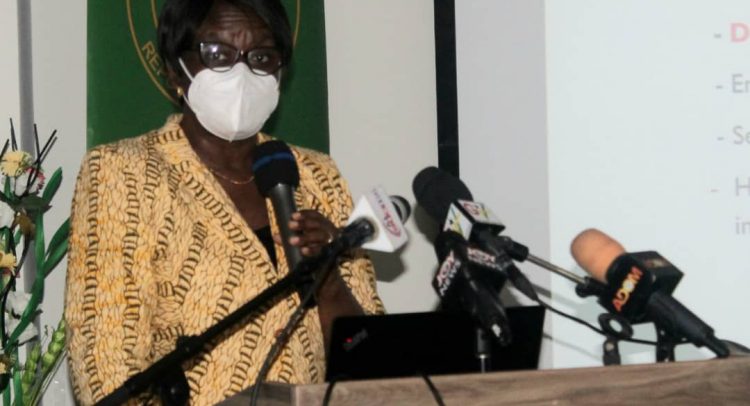Dr. Isabella Sego Moses
The Ghana Health Service (GHS) has urged mothers and caregivers to use the prescribed medication – Chlorhexidine- in the care of the umbilical cord of their new-borns.
According to the health service, Chlorhexidine has proven to be more effective in preventing infections among new-borns, which is one of the leading causes of neonatal deaths in the country.
“Initially, we were using methylated spirit but it has been changed to Chlorhexidine because it is a better antiseptic to prevent umbilical infection, said Deputy Director, Family Health Division, GHS, Dr. Isabella Sego Moses.

She said the medication which was adopted in 2018 following a World Health Organization (WHO) recommendation to improve neonatal survival has proven effective in helping to reduce infections among the group.
“After delivery, the cord is cut and Chlorhexidine is applied and the mother is given some to apply daily until the cord falls and heals, that is the new policy,” she added.
She said the country has been able to reduce neonatal mortality from 32 per 1000 live births in 2018 to 25 per 1000 live births in 2020 because of such interventions.
Dr. Sego Moses said despite the progress made, some caregivers and mothers continue to use ‘other things’ to dress the umbilical cord which harms the child and thus called for adherence to the new policy for umbilical cord care.
She was speaking at the launch of the 2021 Child Health Promotion Week themed,
‘Sustaining child health service in the Midst of Covid-19 pandemic” which starts from 10th – 14th May.
In the past 17 years, the GHS has set aside a week in May to generate demand for routine child health services with focus on topical issues that affects the development and growth of children under five.
This year, the department has outlined activities including orientation of health officers in the regions, engagement of policy makers, opinion leaders, and services delivery in health facilities and outreach points.
Health officers will also organise health communication for mothers and care givers on the need to access preventive interventions to keep children healthy and improve survival and development.
Routine services that will be rendered within this week has also been expanded to include immunization against childhood diseases, Vit A supplement, weighing and height measurement, breastfeeding counselling support, complementary feeding counselling, education on preventive malaria with ITN, education on Covid-19 protocol and birth registration for children under one.
Director General, GHS, Dr. Patrick Kuma-Aboagye said the commemoration of the week has become more pertinent in the wake of Covid-19 pandemic which has made the public stay away from health facilities due to fear of contracting the infection.
He therefore urged the public to support actions that save lives and prevent disabilities by ensuring that children under five years benefit fully from all services offered at the child welfare clinics.
“We on our part are ready to provide these life-saving essential services and have put in place various measures to ensure that all Covid-19 protocols are adhered to in our facilities and service delivery points,” he said.
Jamila Akweley Okertchiri


